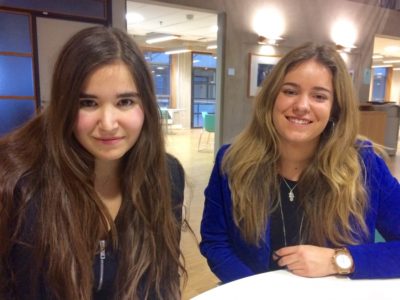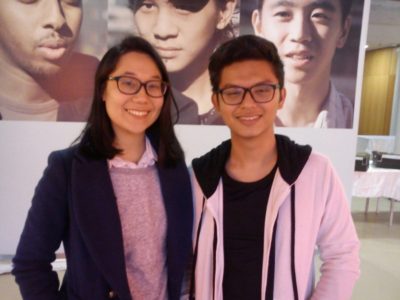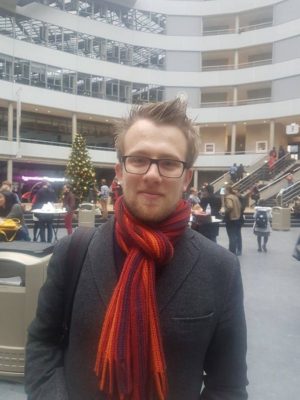Debaters at WUDC – Part 3
There are a lot of different people from a lot of different countries participating at the WUDC and we try to introduce you to as many as possible!
In this part you will find interviews with the following participants:
Beatriz de León and Yolanda González, Spain
Charlotte Gabriel and Nathanael Revaldi, Indonesia
Jan-Gunther Gosselke, Switzerland
Beatriz de León and Yolanda González, Spain

Beatriz de León and Yolanda González – © Johannes Meiborg
AM: Hello who are you two and what brought you into debating?
BdL: I’m Beatriz, 20 years old and I study law and international relations at the University Francisco de Vitania in Madrid. I started debating in university three years ago. As for the reason, it was the best society for what I study and to learn more in general because there are a lot of different students in it. I’ve participated in quite some tournaments, but the only international tournaments so far have been the Lisbon Open and the CMUDE 2015 in Columbia.
YG: I’m Yolanda, 22 years and this is my fifth year of debating. I study journalism and international relations. My reason to start debating was that I wanted to get and practice abilities like teamwork, analysis, structure of thoughts and spontaneity to be able to quickly react to different argumentations. The international tournaments I have visited so far are the Lisbon Open and the CMUDE 2015 and 2016 in which I reached the final both times.
AM: What does the Spanish circuit look like?
BdL & YG: Basically all main universities have a debating society and they all debate three different models: BPS, academic format and MUN. The academic model is more about knowledge and facts since you get a month preparation time. All debate formats are in Spanish so we don’t practice much English. There are a lot of tournaments in these formats, almost one each weekend. Every debating society has to do a tournament each year and participate inas many as possible to get prestige.
AM: Would you say there’s a difference between debating international BPS and Spanish BPS?
BdL & YG: The Spanish judging criteria are probably a bit different, international debating focuses more on analyzing and in-depth of the material.
AM: How do you like the WUDC so far?
BdL & YG: It’s a good opportunity to meet people but it’s also a tough challenge for all Spanish teams because of the language and all of the strong teams. The organization team has a difficult job to do but it works good so far. We have a really good house but the accommodation is too far outside.
AM: Thanks! Good luck for the next rounds!
The interview was conducted by Johannes Meiborg.
Charlotte Gabriel and Nathanael Revaldi, Indonesia

Charlotte Gabriel and Nathanael Revaldi – © Johannes Meiborg
AM: Hey guys, tell us a bit about your debating background!
CG & NR: Currently both of us debate for the English Debating Society at the Universitas Indonesia. We both started debating around eight years ago in high school where we were kind of rivals. By now we have competed in probably more than 30 tournaments with the ABP in Malaysia and WUDC in Thessaloniki being the most recent international ones.
AM: That is quite a number. How successful have you been?
CG & NR: We reached the ESL quarter finals in Thessaloniki, the EFL grand final of the ABP and have won a National.
AM: Since the National is an Indonesian tournament, can you tell us how the debating circuit in Indonesia looks like?
CG & NR: Geographically it is mainly centralized on Java but is spreading to other islands as well with for example coaches coming in to improve the situation there. We usually debate in Asian Parliamentary Style, a 3v3 format. There are also a lot of tournaments, several small ones and three big Nationals. One of the three Nationals is constantly hosted by the UI Law School, the other two rotate. They also use different formats, one uses the Australs format and two use Asian Parliamentary. There is also one big tournament in British Parliamentary which is hosted by the government. The finalists of that tournament who signed up for the WUDC before the tournament get funded.
AM: What would you say is the biggest difference between international and Indonesian debating?
CG & NR: Probably in the approach of the closing half of a debate. Internationally a closing team can just extend an already existing argument or give more context and win with that while in Indonesia you always have to bring new stuff.
AM: What brought you into debating?
CG: I actually wanted to improve my English and saw it as an opportunity to do so. After a while I also saw it as a platform for intellectual challenges and was stuck in this evil cycle. The environment is also really inclusive.
NR: It was basically the same reason for me. I had to join a club in high school so I joined the English club which also had a debate section.
AM: Last question: What do you think of the Dutch WUDC so far?
CG & NR: So far we had good debates and good judges, the motions are challenging and the opponents tough. And we run on time which is a huge improvement to last year!
AM: Thank you – enjoy the tournament!
The interview was conducted by Johannes Meiborg.
Jan-Gunther Gosselke, Switzerland

Jan-Gunther Gosselke – © Helena Hecke
AM: Which University are you from?
JGG: I don’t study anymore. I just finished at the University of St. Gallen, where I did my bachelor and now I’m enjoying debating as a judge, whilst working.
AM: Why did you start debating in the first place?
JGG: Because a friend of mine told me it’s a great way to get more informed about political topics and to train yourself in public speaking.
AM: And why are you still debating?
JGG: The competitive elements. The sports elements, actually.
AM: And how does debating look like in your country?
JGG: It’s all a bit different, because there are two formats competing. One is BPS, just a bit different, occasionally. For example you’re allowed to shout in during each others’ speeches and apart from this there is this the other format, which is more about public speaking. So that’s a little bit different. And it’s mostly in German! Switzerland, Austria and Germany together are one German speaking circuit.
AM: And how many tournaments are there in your circuit?
JGG: Quite a lot. Maybe about 30 a year.
AM: And what do your typical tournaments look like? How do they differ from Worlds?
JGG: They’re different from Worlds, because sometimes they try out to set “innovative” types of motions or other new stuff like recently they tried live-streaming the adjudication discussion and stuff like that, which I find rather interesting. Aside from that, the usual tournament is of course much smaller in size. So it’s usually 20 teams per debate tournament.
AM: What do you love most about debating?
JGG: To see how different speakers approach the same motion in so many ways and how they try to structure their speeches very differently, but are all kind of convincing.
AM: How would you describe debating to someone who has never debated before in just six words?
JGG: A sport for people who think they’re intellectual.
AM: What’s your impression of Worlds so far?
JGG: So far I’m enjoying it. I mean, there were some fun parties, the motions they selected are not wired, but they’re good in average. There is a lot of lines, though.
AM: What was the most striking experience so far? Good or bad?
JGG: Actually the bonding with the other guys from my house, which are the people from Vienna. It was a really fun time with them so far. That was probably the most fun part so far.
AM: Thank you and enjoy the rest of Worlds!
The interview was conducted by Helena Hecke.
jm./hh./lok.





